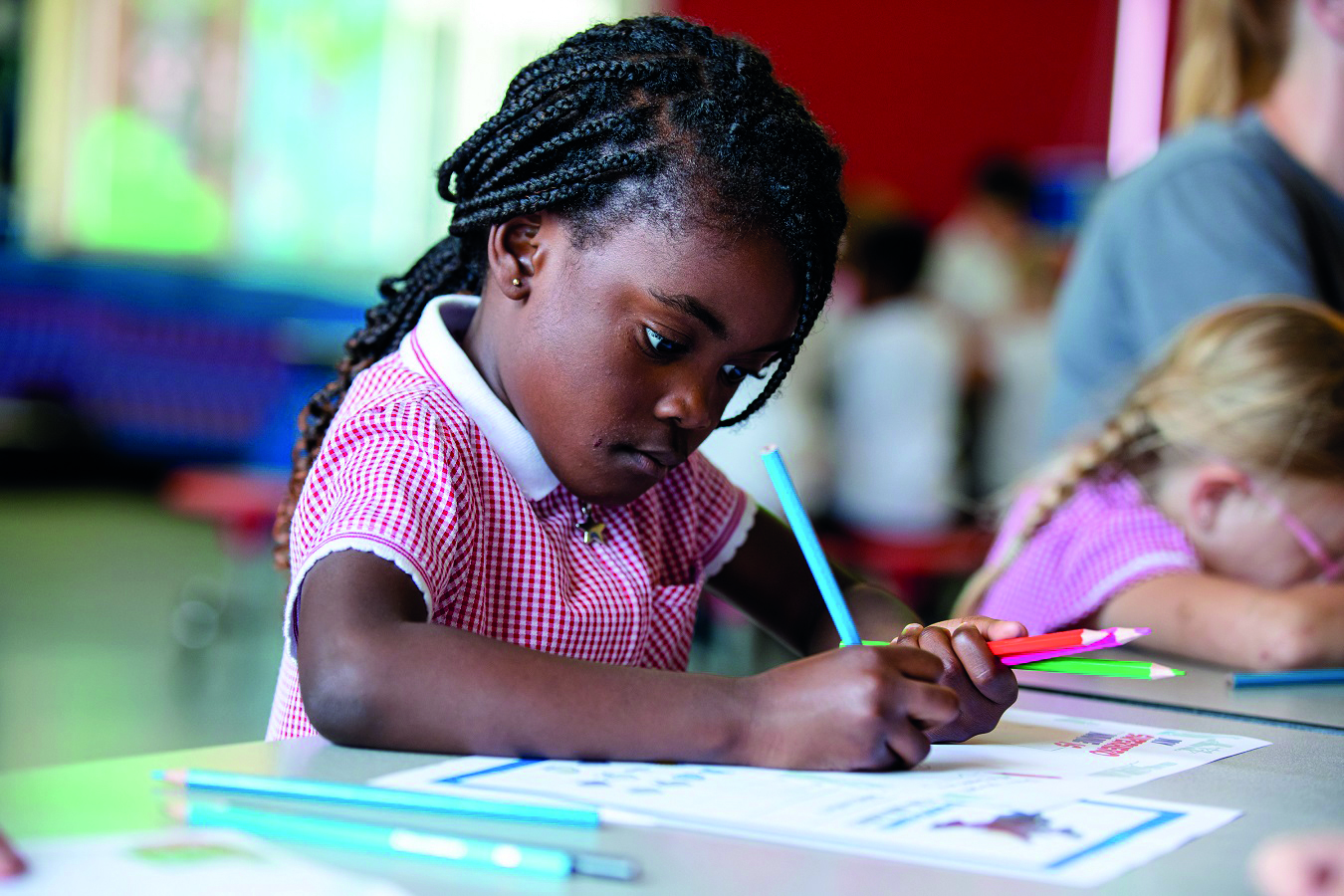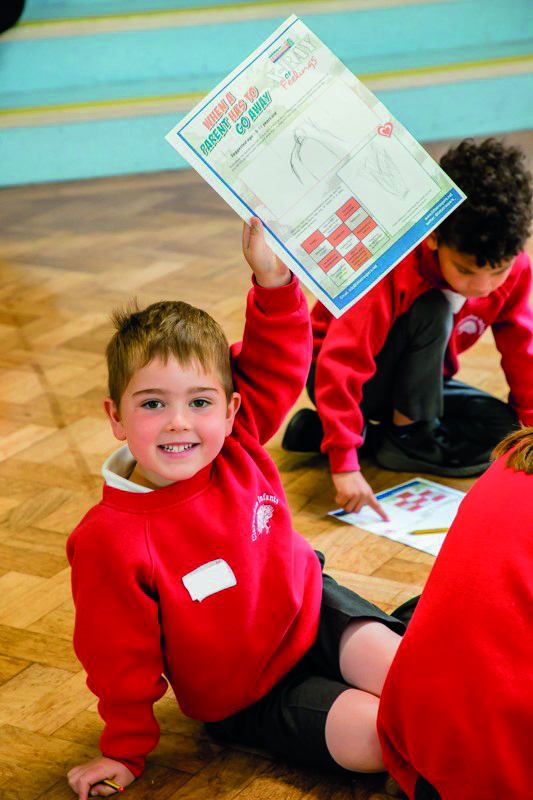
Approximately 100,000 British children have parents serving in the armed forces. More than half of these attend an educational setting with fewer than ten other children from military families. Often, children are not only separated from their parents for long periods, but are also in settings not necessarily used to supporting their needs.
In response, Louise Fetigan, herself a former soldier and a military spouse, founded the Little Troopers charity in 2011. ‘Children who have parents serving in the armed forces typically experience frequent periods of separation from their serving parent,’ she explains.
‘Many military families also move home frequently, which means children have to move nursery or school. Some families choose to stay in one location, but this means living apart from the serving parent.’
SEPARATION
Parents serving in the military could be away for a week or two on a course or exercise, or for months on end on deployments overseas. Either way, the separation can put strain on children, especially in the first few years of life, Fetigan says.
‘We find the biggest impact for this age group is often during periods of separation from their parent, even if this time period is quite short. Children at this age live in the moment and have no real sense of time. So, whether their parent is in the Falklands, or a mile down the road on Salisbury Plain, it makes no difference to them – the parent is still not at home.
‘Of course, lots of families stay in touch by smartphone, but serving personnel don’t always have access to the internet or the ability to charge their phone, and the lack of routine, for example, if a parent can only call occasionally and at unpredictable times of day, can be disruptive and difficult for young children to cope with.’
The charity has found an increase in behavioural changes in children dealing with these separations, including:
- disruptive behaviour at nursery
- problems with sleep
- toilet-training regressions
- changes to eating patterns.
SUPPORT
 Little Troopers works with parents and schools to support children from military families.
Little Troopers works with parents and schools to support children from military families.
The charity has produced its own series of books about military life, early years outfits including Royal Navy, Army and RAF uniforms for role play, and craft activities which can be used at home or in schools.
The organisation has also created a free story recording app allowing parents to record themselves reading a story for children to watch while they are away.
Printable separation diaries and memory boxes help children and parents document their time spent apart and share when reunited, while time difference charts can make children more aware of where their parent is.
A Little Troopers at School programme provides primary school teachers with resources, lesson plans, activity ideas and useful information, while a military child wellbeing course will provide one-to-one as well as group therapy sessions.
Two free, virtual workshops for schools model interactive sessions to get children dancing, drawing and playing games while exploring what life is like growing up in an armed forces community.
HOW SETTINGS CAN HELP
 Little Troopers recommends that settings work with families to support children together.
Little Troopers recommends that settings work with families to support children together.
‘It's important that nurseries and schools keep an open dialogue with parents,’ says Fetigan. ‘The one certainty of military life is uncertainty, so practitioners should be switched on to any changes in circumstances at home and show understanding if these changes impact on a child's behaviour.’
Fetigan also points out there are plenty of positive elements to being a child of service personnel.
‘Our military children deserve to be celebrated and recognised for being the special little troopers they are, and we’d really encourage settings to make service children feel included every day, not just when they are experiencing challenge or change at home,’ she says. ‘Invest in books that have military children as the protagonist and include military uniforms in early years dressing-up boxes so service children can dress-up like their parents and show their friends.’
CASE STUDY: Merry Hill Infant and Nursery School in Bushey, Herts
Merry Hill is located near Northwood Headquarters, and currently has 11 children attending from military families.
Communication with these families is vital, says assistant head teacher Sarah Ineson. ‘Sometimes the children become a bit quieter, and you can tell something's on their mind,’ she explains. ‘If you know they’re moving, you can provide support, like getting pictures of their new home and chatting about it.
‘We encourage families to keep us updated, from a group meeting in September to regular conversations throughout the year.’
The school employs a forces liaison mentor, who runs a Forces Club once a month after school, using resources from Little Troopers including feelings cards to help children discuss their responses to changing schools, moving house or having a parent away.
‘Children can be affected in different ways,’ Ineson adds. ‘Siblings who are leaving may have different feelings towards the same move, and while one doesn’t seem fazed by it, and is mainly excited about the thought of going to a different school, the other may feel more anxious about leaving their friends and what their new school will be like.’
The setting has also held an event for children based on Little Troopers’ virtual workshop and resources. ‘It focused on the feelings and emotions involved in being in a forces family, and on mitigating the impact of moving around,’ explains Ineson. ‘We had a series of games and activities, made posters, and talked to the children about their emotions to validate their feelings.’
Resources include a series of pictures called the X-Ray of Feelings, showing an x-ray of a child's body suggesting thoughts and feelings they might experience when facing military life situations, such as ‘my brain is full of questions’, or ‘my head hurts because I miss mummy so much’, accompanied by an activity sheet created by an educational psychologist.
Military parents are invited to attend a Remembrance Day assembly in uniform. ‘Children love to see the medals,’ says Ineson. ‘Some parents have spoken to the whole school about their job, what it entails and what life is like in the forces.’
CASE STUDY: the Atkinson family
Hannah Atkinson and her husband met while serving as submariners. Her husband continues to serve, spending anywhere between two weeks and several months away at a time with no contact with their five- and two-year-old children.
‘They are very used to him going away for two weeks, but it starts to get harder when it's longer,’ she explains. ‘It's all about getting them into a routine and explaining what daddy is doing and that he will always come back. You have to keep them occupied and help them understand that of course they will have bad days, because we all do.’
The family uses the Little Troopers Treasures app, which allows the children to read a story along with their father while he is away, using a pre-recorded video. ‘It's nice for the kids to be able to hear and see their dad,’ says Hannah. ‘They definitely sleep better after the stories.’
Hannah is trying to convince her daughter's school to work with Little Troopers. ‘I think the school would benefit from their workshop, because unless you’ve been in the situation yourself, it's hard to fully understand what it's like to be a military child,’ she says.









